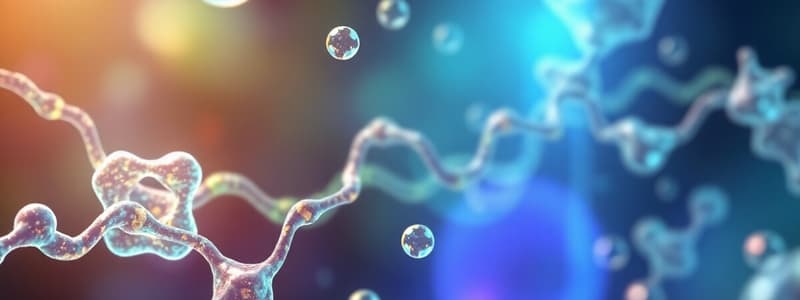Podcast
Questions and Answers
What are the building blocks of proteins?
What are the building blocks of proteins?
- Fatty acids
- Amino acids (correct)
- Nucleotides
- Monosaccharides
What is the process called that involves the breakdown of complex molecules, releasing energy?
What is the process called that involves the breakdown of complex molecules, releasing energy?
- Metabolism
- Catabolism (correct)
- Synthesis
- Anabolism
What is the primary function of enzymes in biochemical reactions?
What is the primary function of enzymes in biochemical reactions?
- To catalyze reactions (correct)
- To provide energy
- To slow down reactions
- To act as substrates
Which process converts light energy into chemical energy in plants?
Which process converts light energy into chemical energy in plants?
How is DNA replicated during cell division?
How is DNA replicated during cell division?
Which technique is primarily used for the separation and analysis of mixtures in biochemistry?
Which technique is primarily used for the separation and analysis of mixtures in biochemistry?
Which component is crucial for maintaining homeostasis in biological systems?
Which component is crucial for maintaining homeostasis in biological systems?
What involves the conversion of biochemical energy from nutrients into ATP?
What involves the conversion of biochemical energy from nutrients into ATP?
Flashcards are hidden until you start studying
Study Notes
Overview of Biochemistry
- Biochemistry is the study of the chemical processes within and related to living organisms.
- It combines principles of both biology and chemistry to understand life at a molecular level.
Key Components of Biochemistry
-
Macromolecules
- Proteins: Composed of amino acids; essential for structure, function, and regulation of the body’s tissues and organs.
- Nucleic Acids: DNA and RNA; responsible for genetic information storage and transfer.
- Carbohydrates: Sugars and starches; essential for energy storage and supply, as well as structural components.
- Lipids: Fats and oils; important for energy storage, membrane structure, and signaling.
-
Metabolism
- Anabolism: The process of building up complex molecules from simpler ones, requiring energy.
- Catabolism: The breakdown of complex molecules into simpler ones, releasing energy.
-
Enzymes
- Biological catalysts that speed up chemical reactions in the body.
- Specificity: Each enzyme works on a particular substrate.
- Factors affecting enzyme activity: temperature, pH, substrate concentration.
Cellular Processes
- Cellular Respiration: Conversion of biochemical energy from nutrients into ATP, involving glycolysis, the Krebs cycle, and oxidative phosphorylation.
- Photosynthesis: Process by which green plants convert light energy into chemical energy in the form of glucose.
Genetic Biochemistry
- DNA Replication: Process by which DNA makes a copy of itself during cell division.
- Protein Synthesis: Involves transcription (DNA to mRNA) and translation (mRNA to protein), crucial for gene expression.
Techniques in Biochemistry
- Chromatography: Used for separation and analysis of mixtures.
- Electrophoresis: Technique for separating macromolecules based on size and charge.
- Spectroscopy: Used to analyze molecular structures and concentrations.
Important Concepts
- pH and Buffer Systems: Maintains homeostasis in biological systems.
- Metabolic Pathways: Series of chemical reactions occurring within a cell; regulated by enzymes.
- Signal Transduction: Process by which cells respond to external signals through molecular pathways.
Applications of Biochemistry
- Medicine: Understanding diseases at a molecular level for drug development.
- Biotechnology: Genetic engineering, biofuels, and the development of new materials.
- Nutrition: Study of nutrients and their metabolic roles in health and disease.
Biochemistry Overview
- Study of chemical processes in living organisms
- Combines biology and chemistry to understand life at a molecular level
Macromolecules
- Proteins: Composed of amino acids, essential for structure, function, and regulation
- Nucleic Acids: DNA and RNA, responsible for genetic information storage and transfer
- Carbohydrates: Sugars and starches, essential for energy storage and supply, and structural components
- Lipids: Fats and oils, important for energy storage, membrane structure, and signaling
Metabolism
- Anabolism: Building up complex molecules from simpler ones, requiring energy
- Catabolism: Breakdown of complex molecules into simpler ones, releasing energy
Enzymes
- Biological catalysts that speed up chemical reactions in the body
- Each enzyme works on a specific substrate (specificity)
- Activity affected by: temperature, pH, and substrate concentration
Cellular Processes
- Cellular Respiration: Conversion of biochemical energy from nutrients into ATP, involving glycolysis, the Krebs cycle, and oxidative phosphorylation
- Photosynthesis: Green plants convert light energy into chemical energy in the form of glucose
Genetic Biochemistry
- DNA Replication: DNA makes a copy of itself during cell division
- Protein Synthesis: Involves transcription (DNA to mRNA) and translation (mRNA to protein), crucial for gene expression
Techniques in Biochemistry
- Chromatography: Separation and analysis of mixtures
- Electrophoresis: Separating macromolecules based on size and charge
- Spectroscopy: Analyzing molecular structures and concentrations
Important Concepts
- pH and Buffer Systems: Maintain homeostasis in biological systems
- Metabolic Pathways: Series of chemical reactions within a cell, regulated by enzymes
- Signal Transduction: Cells respond to external signals through molecular pathways
Applications of Biochemistry
- Medicine: Understanding diseases at a molecular level for drug development
- Biotechnology: Genetic engineering, biofuels, and new material development
- Nutrition: Study of nutrients and their metabolic roles in health and disease
Studying That Suits You
Use AI to generate personalized quizzes and flashcards to suit your learning preferences.




